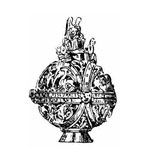
Was Pope Benedict XVI Holding Back the Destroying Flood?
LITURGY & THE CHURCH'S DESTINY
“We see how the power of the Antichrist is expanding, and we can only pray that the Lord will give us strong shepherds who will defend his church in this hour of need from the power of evil.” — Pope Emeritus Benedict XVI, 2015
German journalist Peter Seewald first met Joseph Ratzinger in 1993, when the former worked for a liberal publication with a reputation for criticizing the Catholic Church, and the latter was prefect of the Congregation for the Doctrine of the Faith (CDF) and had a reputation as the Church’s “doctrinal watchdog.” Over the next three decades, the two would develop not only a close working relationship — together they produced four book-length interviews — but a close friendship. Seewald credits Ratzinger with influencing his rejection of the atheism into which he had fallen as an adult and his reversion to the Catholicism of his youth. After Ratzinger acceded to the Throne of Peter as Benedict XVI in 2005, Seewald wrote the Pope’s biography and, after the latter’s abdication in 2013, assisted him in writing his autobiography, Last Testament: In His Own Words (2016).
Suffice it to say that Seewald enjoyed a privileged perspective on the late Pontiff, who passed away in December 2022. He probably knew him as well as — or better than — anybody else in the world did.
In two recent interviews, first with Kath.net, an Austrian Catholic news site (published in English in Inside the Vatican, Sept.-Oct. 2023), and later with NewDailyCompass.com, an Italian Catholic news site (published in English in Inside the Vatican, March-April 2024), Seewald — as interviewee rather than interviewer — shared some surprising insights into certain aspects of Ratzinger’s pontificate. Why surprising? Because Seewald sees him as playing a crucial role in the second coming of Jesus Christ in the Last Days.
When those Last Days will come to pass, and whether they are already upon us, has been the subject of great speculation, not only in our time (see, for example, James Patrick’s article “Are We Living in the Last Days?” Jan.-Feb., and James M. Roseman’s letter in response, April) but throughout Christian history, much of it based on a few rather oblique passages of Scripture.
You May Also Enjoy
While Pope Francis doesn't deny the truth or the faith, he implicitly calls some of it into question, not only by his call for a re-ordering of priorities, but through his uncertain and inexact language.
Now in our time an edition of the BCP has appeared under the auspices of the Roman Catholic Church, which does what none of its predecessors did or could do.
The figures are telling: two million Iraqis are displaced internally and two million others have already fled the country.

